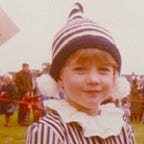How’d i get here ? — Chapter 1
Teen and uni
OK. Imagine a small, anonymous house, in an insignificant town in the UK. A shy and awkward boy at a rough school, bullied into a quiescent angry silence, finds a form of safety hiding in science. Poor humanities and art teachers created no safety in that rough world for the exploration of the grey areas, or for creative expression. And in as esteem-destroying climate of sports jocks, maths, physics and chemistry are knowable, with a clear right/wrong, and so make the perfect armour. There’s a brittle safety in repeating to yourself yeah, maybe i won’t hit you back. but i know i’m clever.
Then a campus university did everything it should have done. I was good at chemistry, but it rapidly bored me. I started hanging out at friends’ lectures, finding this odd place where people argued about what was true and what wasn’t, who argued about the frame through which truth and knowledge could even be discussed. The literature and history schools expanded my mind but revealed the enormous gap in my knowledge. I felt like a fool. So i grappled the only way i knew how: find some facts. I bought The Penguin History of the World by JM Roberts. Read it cover to cover in a weekend. And it awakened a thirst i’ve never slaked for cross-domain knowing — a catholic approach to knowing something about everything and a distrust of narrow expertise. And the book also reflected on the limits of history — a knowing that study doesn’t reveal truth just better stories than we had before.
I went off the rails in the final year. I was certain i couldn’t study chemistry and I couldn’t see anything else i was good enough at that people would pay me to do it. I was approaching the time-honoured solution of doing a PhD in order to hide from the world a bit longer. And then came a stroke of luck.
In the postgraduate prospectus for Imperial College London was a course called MSc Science Communication. Be a generalist and tell stories, was what i saw. I though maybe print journalism or radio — i loved factual radio: in these pre-podcast days the radio schedule was the only structure to my time. I applied, i turned out to be a good storyteller and was successful.
But here’s the thing — the course did three things i didn’t expect. First, history and philosophy of science, media studies (lectured by a brilliantly crazy feminist Marxist historian) and sociology finally crushed my scientific certainties. It was like climbing out of a lush and beautiful valley to see vast ranges of mountains and plains beyond. These new ways of thinking were huge, complex, enticing and drenched in puzzles and contradictions. Worth time.
Second, i discovered museums. Since the course required specialisation in a few areas, there were sampler session. And when i tried radio i hated my own voice; I couldn’t get past it. (Older and wiser, I can now see an impact of the bullying — i couldn’t occupy airtime with something so directly me). So with a heavy heart, redolent of my undergrad confusion, i headed to the museum sampler session. And here’s the first real time a leader influenced me. Graham Farmelo was a senior staffer at the Science Museum, London. He led a tour through some galleries and talked about how science can be communicated through museums. I remember a moment, clear as crystal, when he took a few steps backwards into the exhibition ‘Medicine Matters’ and gestured with his hand through the space; he spoke of the distribution of narratives through space, and the creation of a free choice learning environment. At that moment I knew i’d do nothing else — cool stories combined with democracy. I owe him much for that moment.
Thirdly and as importantly, i had my first experience of vulnerability. We all did presentations, a five minutes piece of science communication to our peers. I was terrified. All the bullying fears overlayed the generic normal scariness of presenting. There was no threat, of course. But my amygdala was in overdrive and i panicked my way into the only tutor i felt i could trust — Dr Jane Gregory. Of course she heard me out, i was crying in her office what else could she do? But she heard me, properly heard, and moved me to think of solutions. A smaller group? To strangers instead of classmates? None of these were necessary. I felt heard, and that was enough. I had an ally, before anyone was using that word i found what it meant. She was willing to make something happen to increase my sense of safety, despite its irrationality, and in that she rewarded my vulnerability. From her, I learnt to be vulnerable.
So then some study, a summer internship, a thesis, a passmark in the exams and then onward to a job…
